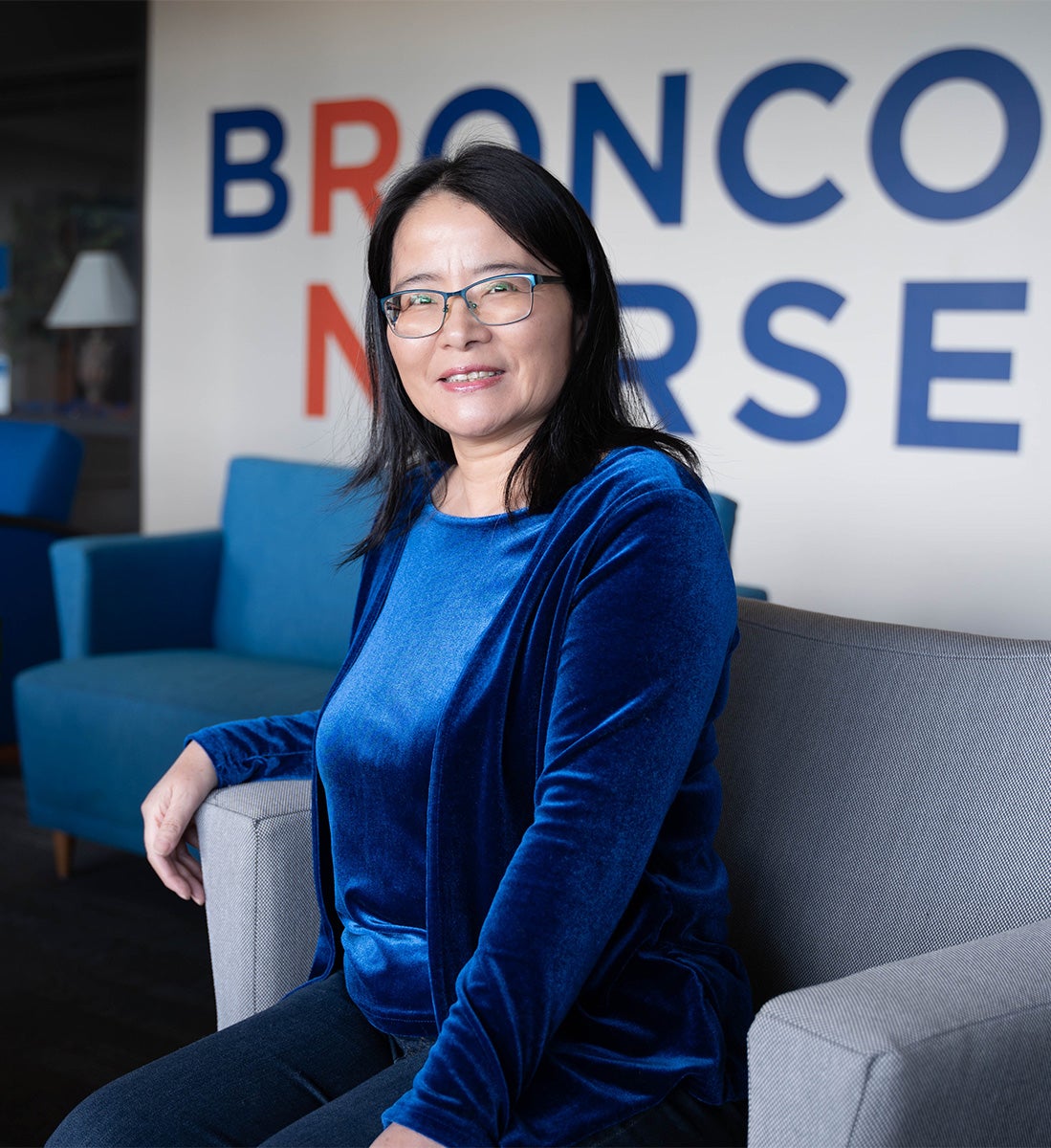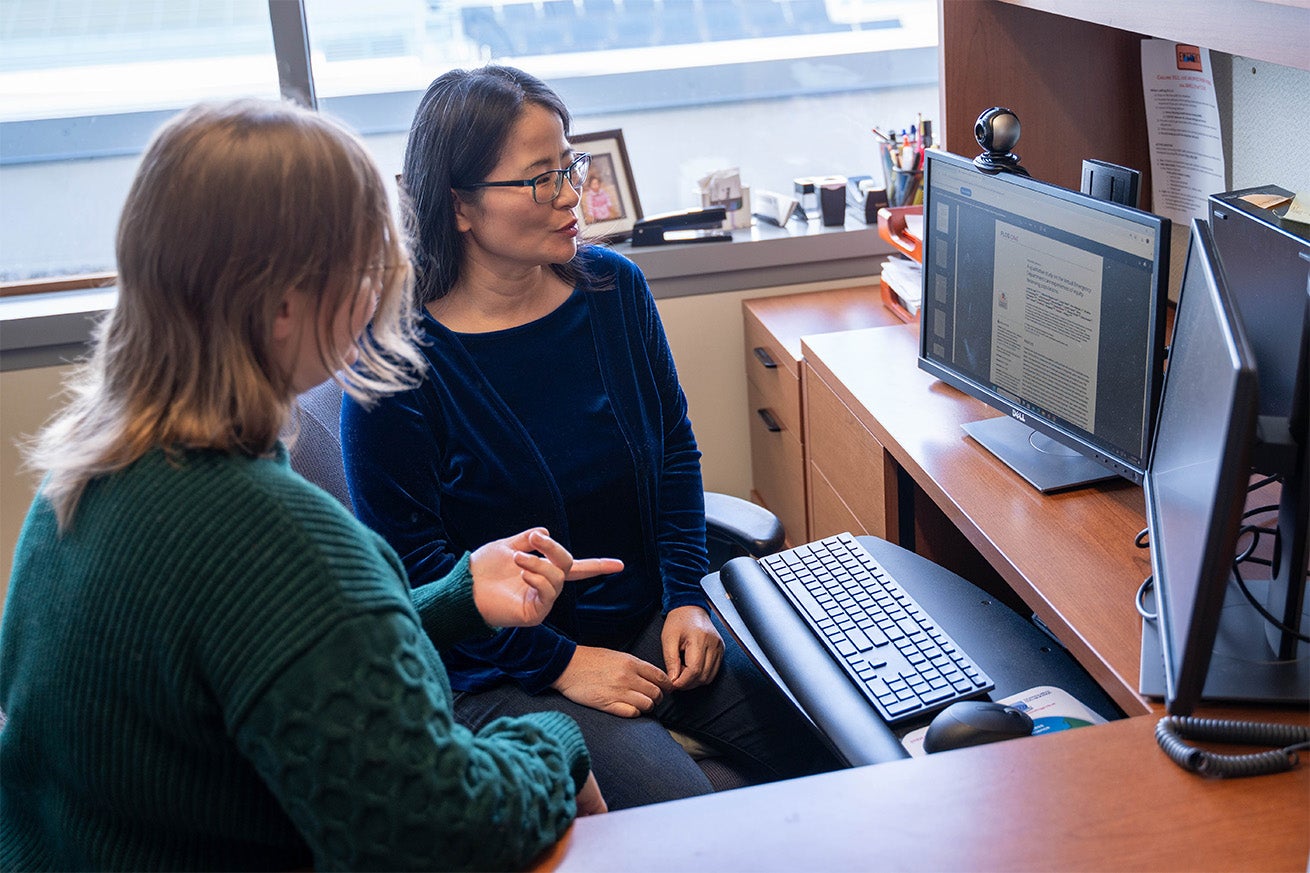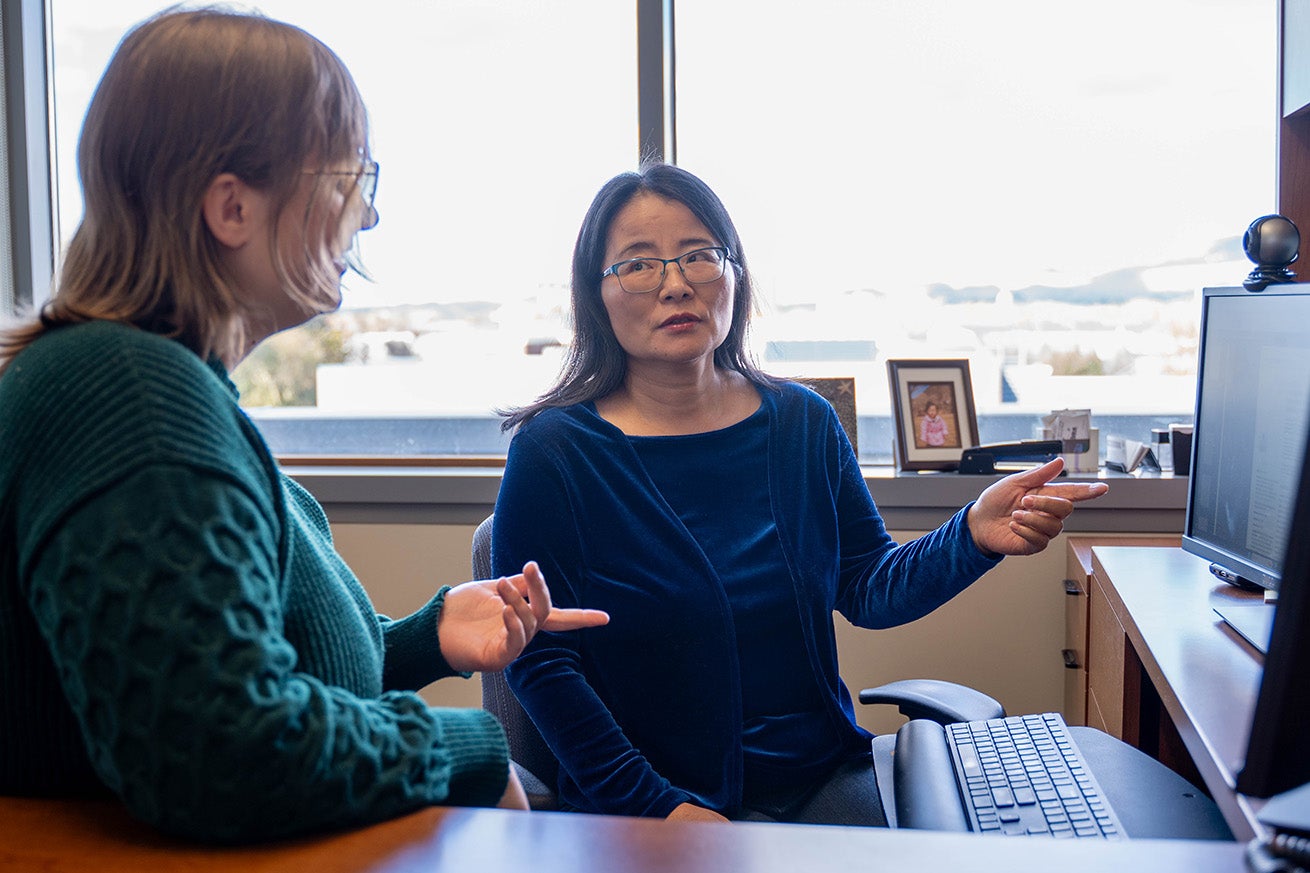Even in an age of innovation, promoting a culture of nursing research is an uphill climb. Some of this is due to perception of what nurses do.
If you ask artificial intelligence “What do nurses do?”, neither Google’s Gemini or OpenAI’s ChatGPT will include research in their answer. Research only makes the list when you ask, “What can nurses do?”
Associate Professor Lucy Zhao notices this trend, too: “I think most nurses are still the same way: ‘Research? No, I don’t think that’s for me. I don’t think we can do that,’” she said.
But Zhao disagrees. Thanks to a joint appointment with St. Luke’s Health System, she spends her time promoting a culture of nursing research among students and nurses in the community.
Joint appointment propels nursing research
Zhao’s joint appointment – a designation formalizing her role with both the university and the health system – benefits the whole community.
St. Luke’s provides a place for Zhao to advance her research in delirium risk factors and directly impact patient care.
“Dr. Zhao’s research focus on delirium is important and timely,” said Laura Tivis, director of nursing research at St. Luke’s Health System. “Nurses play a very important role in identifying and managing delirium.”

Zhao wants to help nurses understand that research is essential for advancing patient safety and the quality of care they receive. Ultimately, her goal is to continue training up the next generation of nurse scientists.
“I really hope that through the collaboration we can promote more nursing research in the clinical setting,” Zhao said.
One way she does so is as a mentor for St. Luke’s nurse scientist apprenticeship program, which Laura Tivis oversees. The goal of the program is to encourage nurses “to grow as scientists by reading, appraising, and applying good research evidence in their practices,” Tivis said.
This pairs well with Zhao’s passion for promoting nursing research and positively impacting patients.
“Dr. Zhao’s research provides invaluable insights and implications into how nurses and other healthcare professionals can positively impact quality of care,” Tivis said. “Her research speaks directly to St. Luke’s mission to improve the health of people in the communities we serve, and interconnects with strategic objectives to advance the safety of the care we provide.”
Zhao said she enjoys the joint appointment because she can conduct her research directly in the community and “make an impact and difference in the community and on nursing at [St. Luke’s]. They are very supportive. I think this is a great position.”
“We value our partnership with Boise State University and plan to continue it in line with the mission, vision and strategies of St. Luke’s,” Tivis said.
Mentoring nurses in the community
St. Luke’s has been sponsoring Zhao’s joint appointment since 2020. In this role, she helps one nurse apprentice at a time work toward their goals, such as presenting at research conferences, learning about the grant process or publishing articles.
“This allows us to concentrate our resources into a quality experience that ultimately impacts nurse satisfaction and thereby improves patient experiences,” Tivis said.
Zhao is an accomplished scholar, consistently publishing and presenting research throughout her tenure at Boise State. But while some faculty aim to publish lots of articles, give high-profile presentations or receive large grants, Zhao prioritizes mentorship.
“I believe, if I can get them publishing and working with me, it’s really more meaningful,” she said. “I want to promote them.”
“Our [nurse scientist apprentices] benefit from Dr. Zhao’s mentoring by taking the next step in their research trajectories,” Tivis said. “Through her, they can experience firsthand what a nurse scientist does, how they come up with their research ideas, and importantly, how they quickly transform their data into conference presentations and publishable manuscripts.”
From the nurse’s perspective
“Dr. Zhao has been a fabulous mentor to many of our nurses, especially those in our Nurse Scientist Apprenticeship (NSA) program,” Tivis said.
Elena Jacobs, a registered nurse at St. Luke’s, is one of Zhao’s previous apprentices. Jacobs enjoyed learning with Zhao about best practices for shaping research studies and “the importance of mentorship and making room for others,” she said.

“Boise can still feel relatively small when compared to larger cities and institutions, but after being a part of the [Nurse Scientist Apprenticeship] model, I saw firsthand that we still have extremely educated and driven nurse scientists who are making a big impact on healthcare,” Jacobs said. “This experience inspired me to stay curious and involved in what we are choosing to research after seeing the large impact it has on our patients.”
Jacobs highly valued her time with Zhao. Thanks to Zhao’s influence, Jacobs now encourages nurses to learn more about research and get involved where they can.
“I love clinical practice and spending time with patients, so I was hesitant to explore research, which felt removed from the aspects I enjoy about nursing,” Jacobs said. “Any researcher would tell you that the work they do, though, is exceptionally patient-focused and has such a significant impact on our patients that if the passion is truly in patient well-being and improving care, then you will not be disappointed in the work you can do for them in the research role.”
Impacting students’ research and practice
Perhaps one reason AI and most nurses don’t correlate “nursing” and “research” is because most nursing students don’t even begin their studies interested in it.
Every semester Zhao polls undergraduate students in her nursing research and evidence based practice class: Why do you take this class? How many of you are interested in research?
Most of them frankly admit: they’re only there because it’s a required course. But Zhao doesn’t let that stop her from promoting nursing research.
And students take her words to heart.
Two years ago, the number of undergraduate research assistants in the School of Nursing could have been counted on one hand. This year, when Zhao and co-teacher, Assistant Professor Ryoko Kausler, presented the opportunity, a record-breaking 13 students signed up.

According to Amy Spurlock, professor and Jody DeMeyer Endowed Chair in Nursing, the School of Nursing currently has 17 undergraduate research assistants. This is almost 5% of students in the pre-license program. Spurlock also spoke to Zhao and Kausler’s class about research opportunities in the school and has directly seen the impact of their encouragement.
“Lucy is a role model for nursing students and the impact that research has on improving patient outcomes,” Spurlock said. “As she teaches the research course, she is able to bring real-world experience to help open their eyes to the value and importance of evidence-based practice. Lucy is a tremendous asset to our students and the School of Nursing.”
While Zhao has been told her passion for research is obvious, “mainly I want my students to feel the same way,” she said. “Research is not boring, research is great!”
From the student’s perspective
Sharece Mecham is in her final semester of the bachelor’s of nursing program. She decided to become a research assistant as a way to get more involved and has worked with numerous nursing faculty, including Zhao.
“[The faculty] are so supportive and genuinely want students to accomplish their goals,” Mecham said. “With their help, I have been able to present research at a conference among doctoral candidates and faculty from across the western United States.”
Mecham has come to realize how important it is for healthcare professionals to collaborate with patients and the community, especially because standards of care change all the time.
“We need to always seek out more knowledge and better practice,” Mecham said. “My hope is that with my research, I will help improve the quality of life of patients and members of the community. I also like gaining knowledge on the research topics to use in my own clinical practice and advocacy.”
This is exactly what Zhao hopes students will take away from their time working on nursing research.
“Research is really helpful and beneficial to not just their regular nursing when they’re in school, but also in their future nursing practice,” Zhao said. “I just want to make them feel that all the content is applicable and actually relevant.”